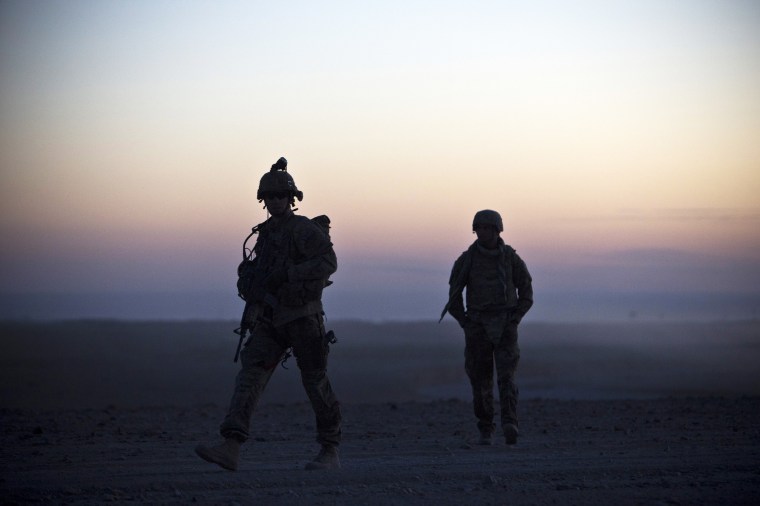WASHINGTON — A bipartisan report released Tuesday urged the Biden administration to postpone a May deadline for the withdrawal of U.S. troops from Afghanistan, warning an early exit would allow terrorist groups to reemerge and undercut a tenuous peace process.
A U.S.-Taliban agreement signed in Doha last year calls for the United States to fully withdraw its remaining 2,500-strong force by May. But the report from the Afghanistan Study Group, commissioned by Congress in 2019, recommended an "immediate diplomatic effort to extend the current May 2021 withdrawal date in order to give the peace process sufficient time to produce an acceptable result."
Although the authors of the report supported efforts by the former Trump administration that had created a "pathway" for peace, they wrote that a "significant revision of U.S. policy" was required to safeguard U.S. interests and ensure peace was secured.
The report was issued against the backdrop of an urgent policy review by the Biden administration, which has already said it is weighing options on Afghanistan and suggested it may delay the scheduled May troop withdrawal.
Although Americans generally agree that it is time to end the war after two decades, the report said, "withdrawing U.S. troops irresponsibly would likely lead to a new civil war in Afghanistan, inviting the reconstitution of anti-U.S. terrorist groups that could threaten our homeland and providing them with a narrative of victory against the world's most powerful country."
The report said its recommended approach "depends on the U.S. negotiating team making clear to the Taliban that they have not fulfilled the conditions in the Doha agreement under which a U.S. withdrawal can take place."
Under the U.S.-Taliban or Doha agreement, Washington agreed to withdraw American troops in return for the Taliban agreeing to enter into peace talks with their foes in the Afghan government. It also requires the Taliban to ensure Afghanistan will not be used by Al Qaeda or other terrorist groups to target the United States or its allies, and that the insurgency will not provide assistance to the extremists.
"The Study Group believes that further U.S. troop withdrawals should be conditioned on the Taliban's demonstrated willingness and capacity to contain terrorist groups, on a reduction in the Taliban's violence against the Afghan people, and on real progress toward a compromise political settlement," it said.
The Taliban say they have abided by the terms of the agreement, and that they have made good on promises to the United States not to target U.S. forces or stage attacks on Afghan cities. Peace talks have gotten off to a slow start in recent months, but Taliban representatives have threatened to return to an all-out war footing and abandon the peace process if the Americans and other NATO-led forces do not withdraw by May.
The report argued that, given the six-month delay in the start of peace talks that had been scheduled to begin in March, the Biden administration "can make the case that there has been insufficient time for these negotiations to create the hoped-for conditions under which international military forces could leave Afghanistan by May, as envisaged in the Doha agreement."
A troop withdrawal in May "would not only leave America more vulnerable to terrorist threats; it would also have catastrophic effects in Afghanistan and the region that would not be in the interest of any of the key actors, including the Taliban," the report said.
The authors of the report also said the United States needed to consult its NATO allies and other partners that have troops on the ground, saying previous rapid U.S. troop reductions had taken place without appropriate consultations. An earlier U.S. withdrawal could damage America's credibility with its European allies, the report said.
The United States should view the goal of its military presence in Afghanistan as not only to counter terrorist threats such as Al Qaeda and the Islamic State militants but to help secure a lasting peace settlement between the Taliban and the Afghan government, the report said.
The February 2020 U.S.-Talban agreement and subsequent U.S. troop reductions "clearly demonstrated that the United States is prepared to withdraw from Afghanistan, " the report said. "It should not, however, simply hand a victory to the Taliban."
The report also called for a review of troop levels in Afghanistan, saying the current U.S. force of 2,500 posed risks to the force and to the mission.
The 15-member Afghanistan Study Group was led by three co-chairs, former chairman of the Joint Chiefs of Staff and former U.S. commander in Afghanistan Gen. Joe Dunford; former Republican senator from New Hampshire Kelly Ayotte; and former senior U.S. Agency for International Development official Nancy Lindborg. The study group included retired ambassadors and senior figures from both Democratic and Republican administrations, including Susan Gordon, former principal deputy director of national intelligence, and Mark Green, who served as head of USAID under the Trump administration.
Pentagon Press Secretary John Kirby told reporters he had not read the report and reiterated that the administration was conducting a review of the U.S.-Taliban deal. He added that no decision had been taken on future U.S. troop levels in Afghanistan.
State Department spokesperson Ned Price said the administration was assessing “whether the Taliban are fulfilling their commitments to cut ties with terrorist groups, to reduce violence and to engage in meaningful negotiations with the Afghan government and other stakeholders.”


